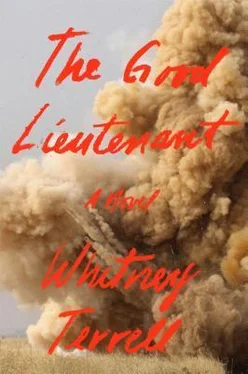It was a bad speech, she could see that, but maybe its badness helped; she could see Jimenez cover a smile with his bandanna. “Are we clear?” she said.
“Yes, ma’am,” Jimenez said. “We all equal in the fuck.”
She crossed the field. The detainee was conscious, cuffed, and moaning a little bit. He had thick black unwashed hair and a long, delicate nose, and a mole high up on his cheekbone, like a beauty mark. “He have any papers?” Crawford handed her a heavily worn wallet. She opened it and thumbed through the cards in the plastic sheaths — an identity card. Other printed cards on stock paper. All in Arabic. In his jacket pocket, a folded piece of paper with a pencil drawing of a U in the center, nothing else there … “So this wouldn’t give me any information on why you were out there during an attack on my men?”
The man averted his gaze. “This is stupid,” he said.
“Okay, that’s progress,” Fowler said. Then, tucked inside an interior flap of the wallet, a plastic military ID card — Faisal Amar was the man’s name — a worker number, and an interpreter pass signed by Bert Masterson of Delta Company.
“Jesus Christ, Beale,” she said. “Why not get lucky, for a change?”
* * *
Beale’s and Pulowski’s voices argued inside her head as she sat at her desk, staring numbly at the sworn statement form, on which she was supposed to describe what had happened during the attack on the RG, the commands she’d given, the order of events. What were the choices? It was one thing to tell her platoon that the detainee was her responsibility, it was another to write it down in a sworn statement whose facts could be checked. The right thing was to tell the truth. The other right thing was to accept responsibility. But when she tried to put the two together, the report seemed more doormat than brave: As Dogpound Platoon leader, the injury of the detained Iraqi was my responsibility. I did not have zip cuffs with me and thus was unable to secure the detainee quickly enough in the immediate aftermath of the attack. If I had done this properly, Sergeant Beale would never have struck the Iraqi … She stopped there, unable to close the sentence. Maybe the mistake was sitting around whining to herself about wrong and right at all. Whining never helped — it made as much sense as telling someone that you were so concerned about their safety that you couldn’t be around them anymore. And then disappearing to fucking Tennessee.
And yet, if there was one thing that Pulowski had taught her, it was how to formulate a thesis and then back it up objectively. That, and facts were naïve.
She erased the last line and wrote, I caused the injuries to the Iraqi’s head and face. And then she pulled out a second piece of paper and added this:
On April 9, 20–, two specialists from the 1st Battalion, 27th Infantry’s Delta Company were killed by a truck bomb at the intersection outside Muthanna , she wrote. At the subsequent battalion briefing, Lieutenant Colonel Seacourt said that two soldiers had died in the explosion, in large part because they had been occupying an un-reinforced checkpoint. And yet, I had been installing concrete T-walls inside Camp Tolerance for three months prior to the bombing at the Muthanna intersection. I had also frequently volunteered to use my platoon’s equipment to haul a load of T-walls out to the entrance of Muthanna and build a reinforced checkpoint. Colonel Seacourt did not follow through on the idea. Instead, he insisted that the Muthanna intersection was “the one place in Iraq that I’d take my grandmother.”
She filed the report by slipping it into the wire basket that had been nailed to the trailer wall beside Hartz’s office, openly in view of her desk. Its disappearance that afternoon was followed by a period of silence that her imagination feverishly tried to make permanent, imagining that her comments on the T-walls might not even be noticed. They had no business being in the report anyway, since the intersection bombing happened four weeks in the past. That evening Captain Hartz informed her — emphasizing that this was only a “bureaucratic requirement”—that she was now officially “relieved of duty” pending an investigation into her conduct. In addition, she was under orders to avoid contact with her platoon, and so, for the next two days, she lived primarily in the fifty yards between her trailer and the head. It was awful. Pulowski’s absence, his lack of emails, and her own stubborn refusal to ask for a response had been bad enough when she was at work. Now Crawford silently delivered her meals in Styrofoam boxes from the DFAC, their tops dusty from his quarter-mile walk along the ravines and footbridges that stood in for sidewalks along their battalion’s main street. She no longer attended morning briefings at the battalion headquarters, but she was cc’d on the email that Colonel Seacourt sent to every member of Echo Company, assuring them that “every soldier in the division” was currently engaged in looking for bombers at the intersection, and that he would know more when the official investigation of the incident was complete. Finally, on the morning of her third day of isolation, Captain Hartz knocked on her trailer and invited her for a ride in his Humvee.
“You understand that they’re going to come after you, don’t you?” Hartz said as they left the parking area, Hartz and his driver in front, Fowler in back.
She glanced up. Hartz was a fireplug of a man, five foot four, a solid 175. Despite his florid sunburned face and rocklike gut, his small tapered hands were curiously delicate, uniformly clean: the kind of guy you might imagine coaching women’s basketball at Junction City High, decent, fair, soft-spoken, and, as Pulowski had phrased it, “aggressively naïve.” “What difference does it make?” she asked. “Fredrickson and Arthur are gone anyway.”
“No, no, no. We are finding whoever did this. You’ve got to believe that, if there’s any chance of it coming true at all. Now take my hand and we’ll say it together.”
“I don’t pray,” Fowler said. She’d respected, and even courted, Hartz’s advice back at Fort Riley, his nostrums about teams and taking it one day at a time being a comfortable kind of truth. Familiar. Not exactly groundbreaking. But spoken in good faith. Today it all seemed aggressively naïve.
“Look, I’m just saying — what’s wrong with a positive thought?”
“Positive thought? What positives are there? You saw my statement. It’s the truth. I screwed up. I should’ve had the zip cuffs on me. I should’ve checked the detainee’s ID immediately. I should’ve been more skeptical of the intel. If I’m going to get my ass in a sling for fucking up an Iraqi, the least I can do—”
“Zip,” Captain Hartz said, holding a finger to his lips.
“—is do something to improve the situation,” Fowler said.
“I said stop.” Hartz lunged over the backseat to grab her shoulder, but the shoulder strap of his seat belt caught the bridge of his nose, giving him the appearance of a man mysteriously caught and held motionless by a finish-line tape. “You’ve got to stop overthinking,” he said as he finally, in anger, unclipped the seat belt and threw it to the side. “The way you’re acting, this worrying about stuff, this questioning everything — let me ask you this, do you like it?”
“I don’t have questions,” Fowler said. “I have bad facts.”
“If I was in a situation where I had my own and other people’s careers at stake, I might start asking some questions,” Hartz said.
“Oh, yeah? Like what?”
“Like, ‘Should I piss and moan about where colonels put their T-walls? Which I can’t control. Or—’”
Читать дальше












